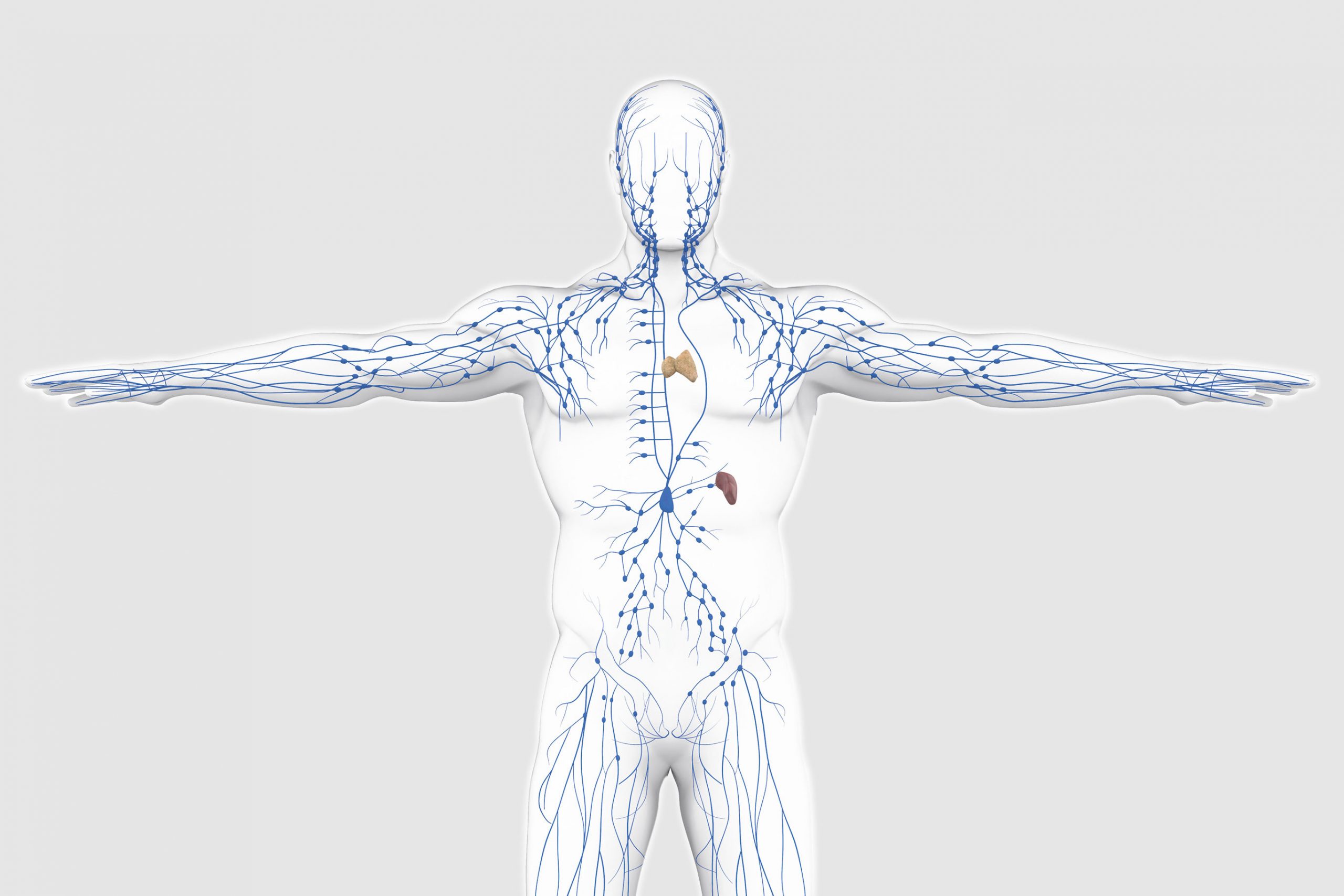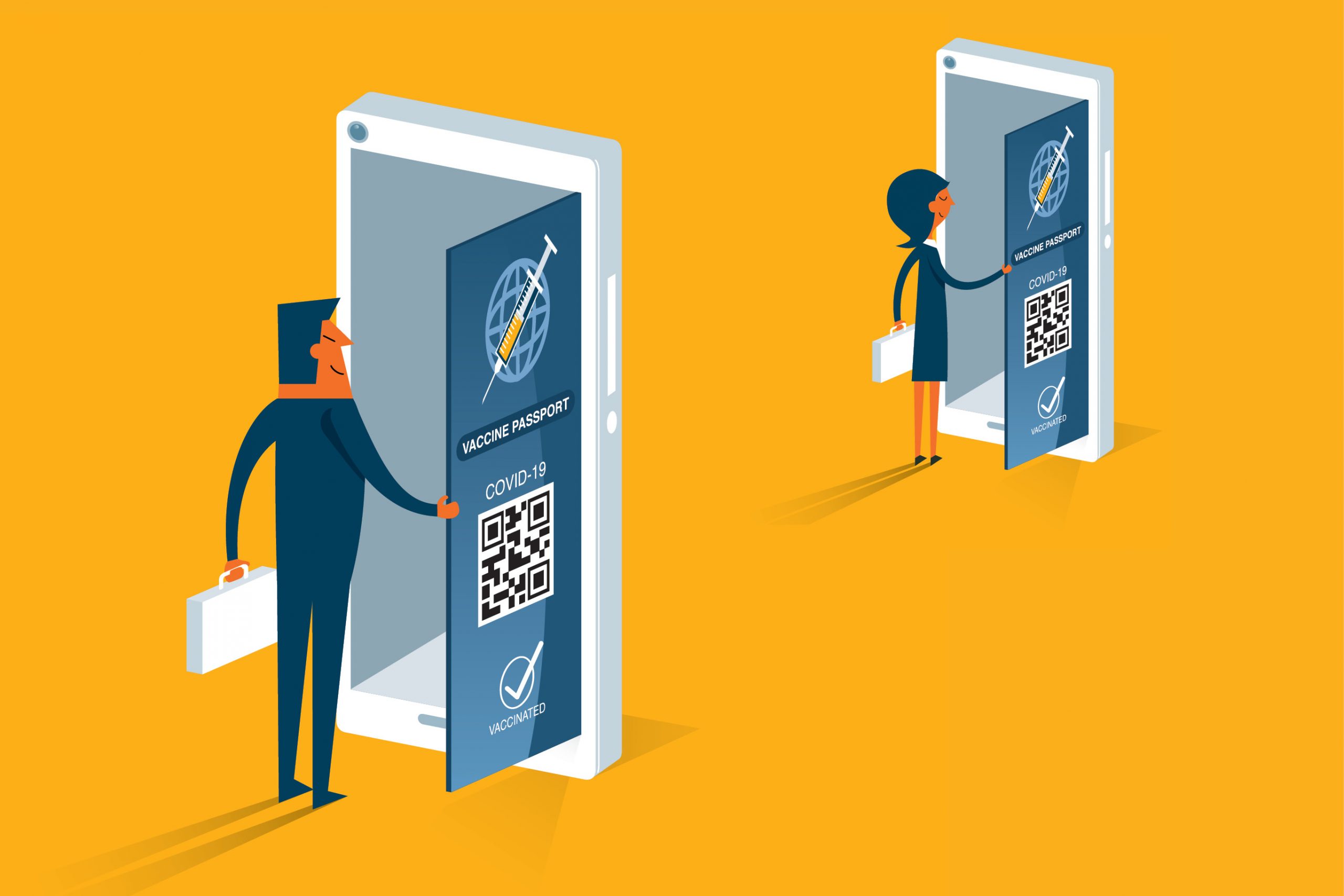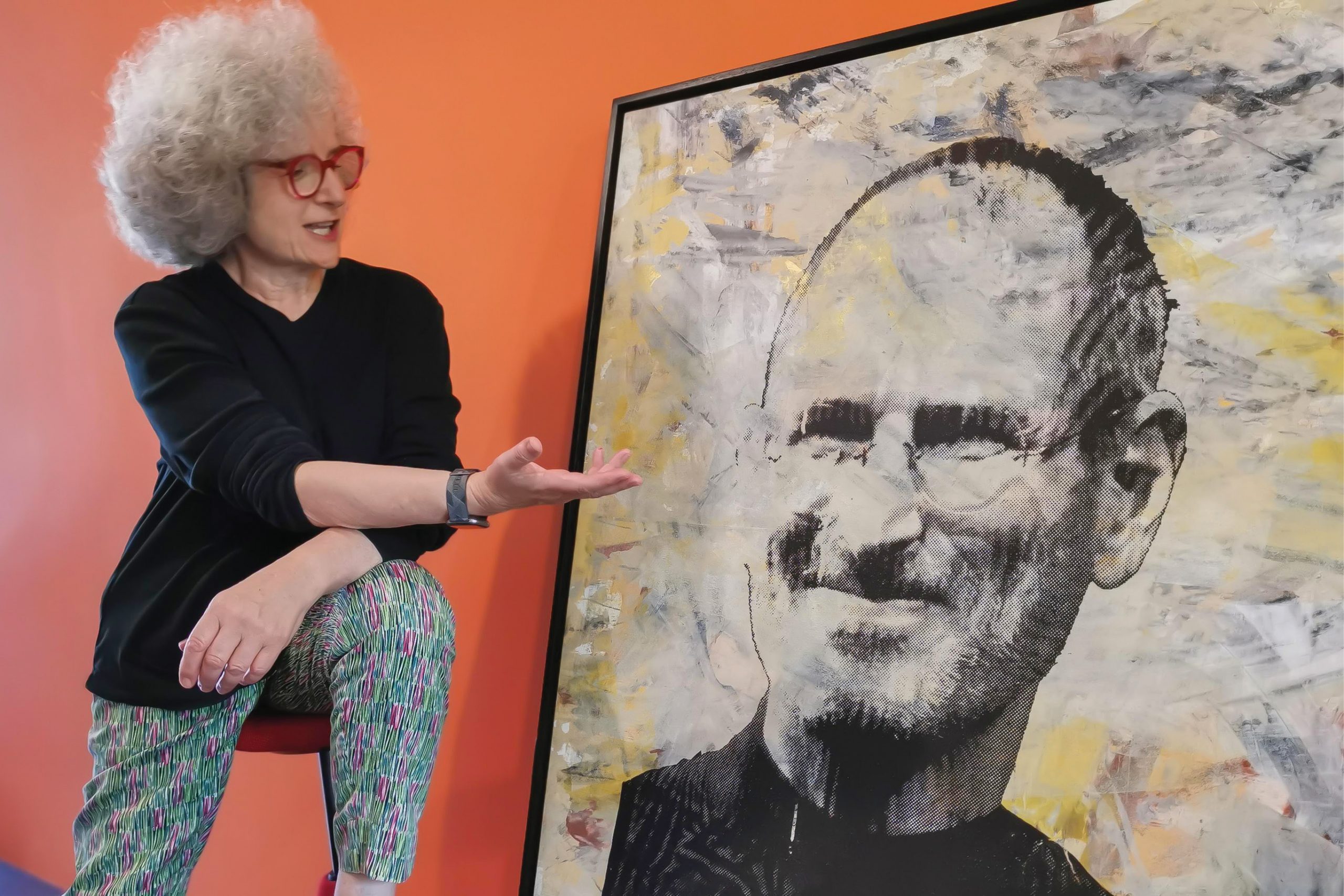
Issue 39 / August 2021
DOSSIER
Medical Education, Technology and Enterprise (METE)
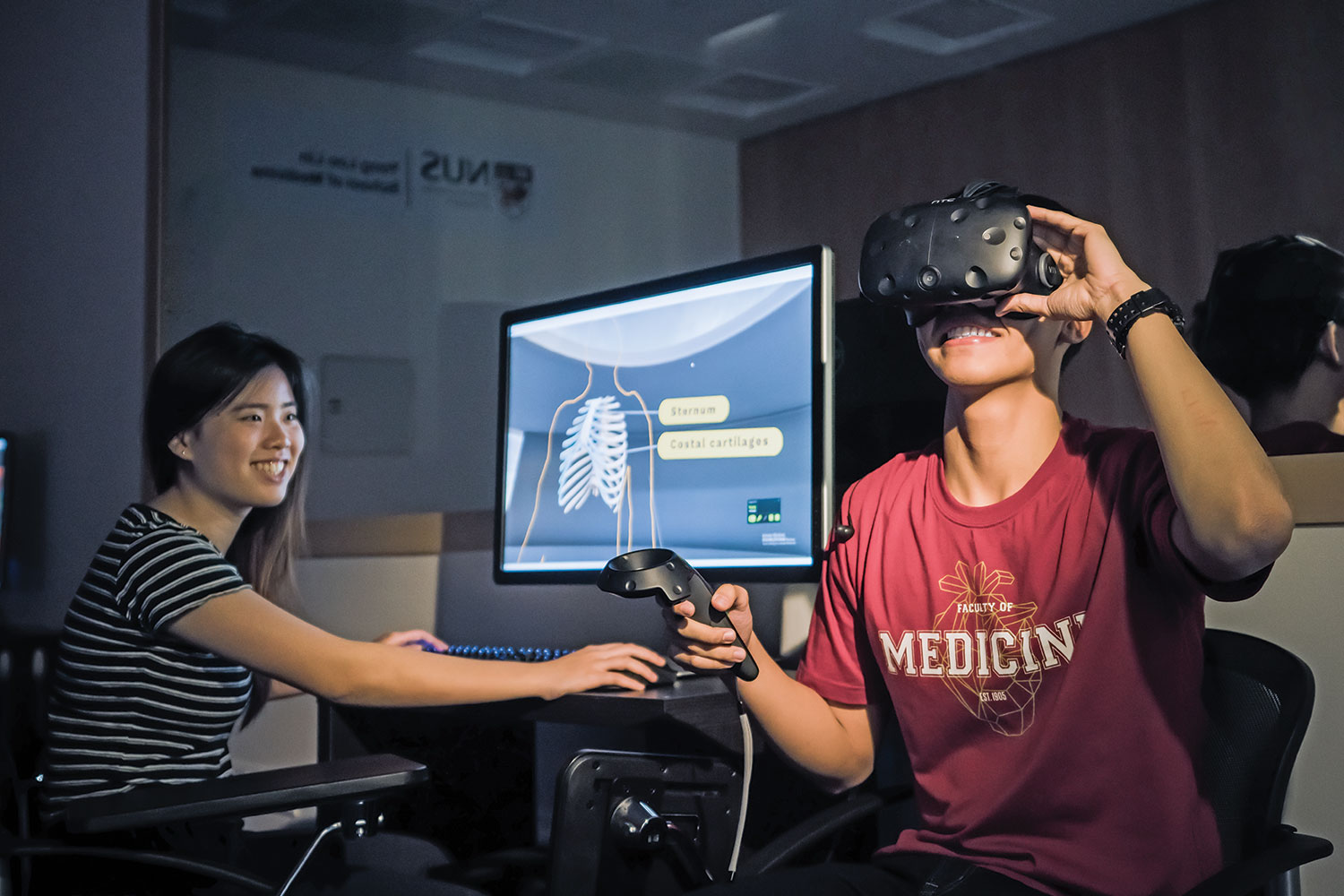
Formed in 2019, the Medical Education Technology Enterprise (METE) Committee anchors NUS Medicine’s strategic goal of promoting innovation in technology for teaching and learning in medical education.
he members of the METE committee comprise faculty members from the clinical departments, medical science cluster, nursing, enterprise office, legal office and administrative team from the Deanery.
Regulate technology-related teaching pedagogy and encourage technology adoption in medical education
METE is the entry point for technology-enabled tools in the market to be reviewed and assessed for suitability for implementation in our medical school curriculum. For example, METE reviewed the recommendations for AMBOSS, Acquifer, Body Interact and other software for implementation at the school. The usage and outcomes of the online tools are also carried out periodically to evaluate their suitability in the curriculum.
In order to encourage the adoption of digital transformation at the school, we have identified various technologies which may be helpful in enhancing medical training. These are summarised in the chart below. Faculty members are encouraged—through various platforms—to think, explore, play, create and innovate using these technologies in medical education. By sharing success stories and showcasing projects at events such as NUHS Educator’s Day, we hope to raise awareness of the importance of digital adoption in medical education.
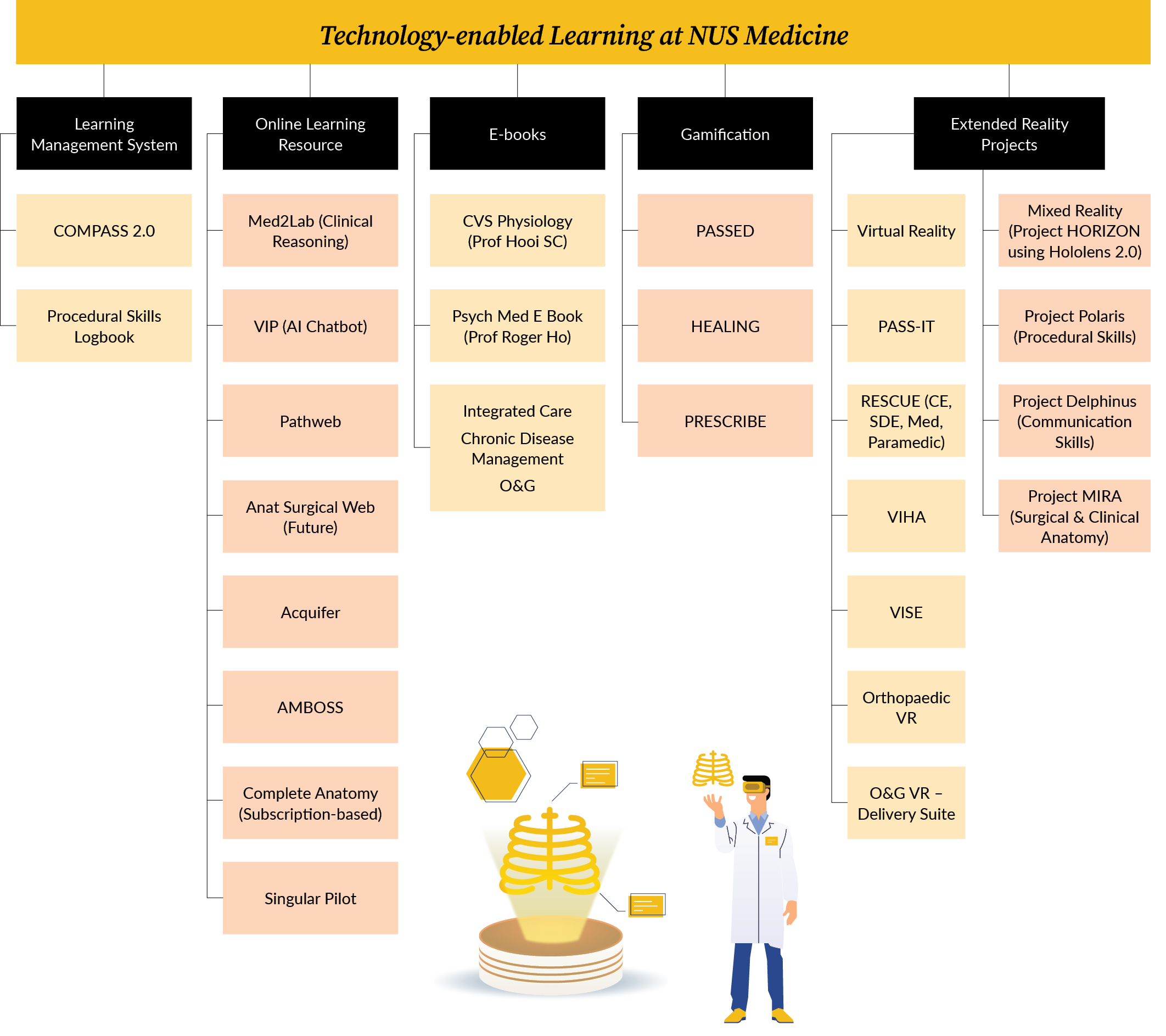
Body to review proposals for technology-related educational pedagogy
METE is able to review the interesting proposals submitted by faculty members to provide appropriate suggestions and support for the projects. Through METE’s effort, we have been able to provide invaluable input for applicants to enhance their projects, and continue monitoring the progress of the projects. One example is the PAtient Safety aS Inter-Professional Training (PASS-IT 2) project. With the successful implementation of the PASS-IT programme, the PASS-IT team has received approval to develop further modules using virtual reality (VR) technology in teaching the niche topic of patient safety in surgery. PASS-IT 2 is currently at the initiation phase and METE is guiding the progress and implementation of the project along the way.
Linking with UGCC at NUS Medicine to recommend suitability for curriculum implementation
An appropriate review process has been put in place for identifying suitable online tools. We will conduct a trial period with free subscriptions from the software company in order to gather valuable feedback from the faculty members. Following that, suitable programs will be recommended for discussion at the UGCC. Where relevant, UGCC will explore with the stakeholders, including the educators at clinical departments and the medical science cluster, to explore the placement of these tools, either as self-directed learning or mandatory guided teaching tools. The bi-directional flow of information and recommendations is essential to ensure robust evaluation of innovative teaching pedagogies before they are implemented into our curriculum. Often, a short pilot study is conducted to gather feedback before formal implementation.
Review funding support for innovative technology-enabled pedagogy
METE is able to provide some funding support for faculty members to develop innovative teaching pedagogies at the medical school. We have provided financial support for the Virtual Integrated Patient (VIP) program to facilitate its content development and scale-up to the implementation phase. In addition, we funded the development of NUS-Med2Lab project, which is led by Dr Chen Zhi Xiong and Dr Soh Jian Yi. The NUS-Med2Lab was developed with the purpose of cultivating a medical learning approach and curriculum for critical reasoning through an online cloud- and case-based platform. Their teaching model combines coursework and technology to address the reasoning training needed for doctors of the future. This universally applicable model teaches critical reasoning by using a simulated virtual patient model. Students learnt through feedback, tailored to their own decision and reasoning patterns.
Working closely with developers based in San Francisco, the NUS-Med2Lab team has successfully created a few modules to teach clinical reasoning at the school. More modules are currently being developed and continuous funding support has been secured through the regular review process at METE.
Funding for innovative projects does not only come solely from the medical school. METE has faculty members with vast experience in grant applications for technology-enabled educational tools. When information regarding suitable grant calls are made available, METE will strive to share these notices and information with the teaching communities. Interested faculty members can seek guidance to apply for these funds and appropriate advice is provided to shape and enhance the proposals before submission.
Collaborate with industry partners to co-develop innovative teaching pedagogies
Using METE as the base, many discussions have taken place to explore partnerships with industry partners in this field. Technology-enhanced innovative teaching tools are widely available in the market. Many of these companies have explored partnering NUS Medicine to create innovative tools in medical education. One of our biggest partnerships currently is with Microsoft Corporation to develop medical training tools using the Hololens 2.0 device, based on the Mixed Reality technology. Project Polaris, one of our first explorations done in close partnership with Microsoft, will explore using Hololens 2.0 platform to develop procedural skills training.
Explore potential enterprising opportunities for unique pedagogical tools created in NUS Medicine
With the appropriate personnel in the committee, we are able to harness the expertise within the school to direct enterprising opportunities at the medical school. One such example is the VIP project. The VIP platform was developed to provide a limitless array of virtual patients. Medical students, early career medical graduates and general practitioners have limited access to patients due to patients’ reluctance to be used as subjects, rarity of certain diseases, etc. Such limitations compromise the development of clinical reasoning skills and diagnostic skills. VIP can randomly generate clinically realistic patients to supplement the gap in medical training and allow true conversation engagement with the virtual patient via a chatbot. VIP also plans to launch speech recognition and voice output on the platform in the future. Created in-house by Prof Edmund Lee, Dr Judy Sng and their team, this project has achieved significant success, and the team is in the process of commercialising this tool for wider use in the medical education community.
Conclusion
At METE, we hope to encourage the faculty members in the school to think about technology as a potential solution to fill curriculum gaps where relevant. In medical training, nothing will be able to replace the sacred relationship between the doctor and the patient, and the fundamentals of medical training will continue to be on patient and real clinical experience. However, technology can enhance the training through standardisation of experience, reducing opportunistic encounters, increase interactivity and making medical training fun. In addition, we can better prepare our students through simulation of these experiences, and also raise awareness of patient safety, before they enter the clinical training environment. The wave of the 4th Industrial Revolution is already here. We must actively embrace the technology and digital transformation with open arms in medical education.
Educators, students and administrators are encouraged to submit their project proposal for funding support from the METE Committee—whereupon the value proposition of the project enriches the learning experience of students. The METE secretariat has digitalised the application and submission of proposal to make the process seamless, convenient and easy.
METE aims to enhance the adoption of digital transformation in medical education, and serves to:
Regulate and encourage the adoption of technology-related teaching pedagogy
Review proposals for technology-related educational pedagogy
Link with the Undergraduate Curriculum Committee (UGCC) at NUS Medicine to recommend suitability for curriculum implementation
Review funding support for innovative technology-enabled pedagogy
Collaborate with industry partners to co-develop innovative teaching pedagogies
Explore potential enterprising opportunities for unique pedagogical tools created in NUS Medicine

